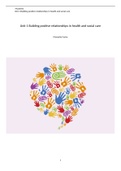Muanshe
Unit 1 Building positive relationships in health and social care
Unit 1 Building positive relationships in health and social care
Munashe Fusire
1
,Muanshe
Unit 1 Building positive relationships in health and social care
Contents
Learning objective Pages
1. Understand relationships in health, social care or child care environments (P1, M1) 3-16
2. Understand the factors that influence the building of relationships (P2) 17-26
3. Understand how a person-centred approach builds positive relationships in health, 27-36
social care or child care environments (P3, M2)
4.Be able to use communication skills effectively to build positive relationships in a 37-46
health, social care or child care environment (P4, P5, M3, D1)
Bibliography 47-50
Appendices
2
,Muanshe
Unit 1 Building positive relationships in health and social care
LO1 Understand relationships in health, social
care or child care environments (P1, M1)
3
, Muanshe
Unit 1 Building positive relationships in health and social care
P1: Explain different types of relationships that can be built in health, social care or child
care environments
1. Individuals who require care and support
Working with Individuals who require care and support is one type relationship built in
health, social care and childcare environments. This type of relationship involves working
with people at different ages who are in need of assistance, at risk of being hurt, or those
who are vulnerable. For example, requiring help to live independently because of a mental
disability, or requiring physical support whilst recovering from an injury. These types of
relationships are built with effective carers with crucial qualities such as being approachable,
kind and empathetic.
Case Study
Chloe is 80 years of age. She lives alone and would like to continue living in her own semi-
detached house, but is need of support. She suffers from arthritis and this stops her from
being able to move freely around her house, at times leading to pain.
She finds it difficult to manage her own personal needs such as washing, dressing and
cooking for herself. Three times a week, a health care assistant will call for three hours to
help Chloe take a shower, dress her and help with cleaning the house.
Chloe has her own personal chef that comes in at the start of every week to help her with
meal preparations, planning and cooking all the dinners she wants to eat in the following
week and also storing them in the refrigerator for whenever she would like to eat.
Chloe is benefitting from home care that allows her to stay in an environment that she is
comfortable with. She is also benefitting from social care as the health care assistant and
the chef regularly come in to communicate with her, making sure she does not feel isolated
as we know that she lives alone. Chloe’s physical needs are being met by her carers because
they help her to stay clean and keep up with good hygiene when she takes her showers. In
addition, they also meet her emotional needs because when talking to her, Chloe will feel
listened to, more at ease and relaxed, making her feel more cheerful. The chef ensures that
Chloe gets to live independently as she has her right to choice met through deciding which
meals she would like to have prepared for the week. When the health care assistant dresses
her, Chloe is the one who makes her own decisions on what she would like to wear. These
things all contribute to making sure that Chloe lives independently in her household.
Midwives
When a woman is going through her pregnancy journey, a midwife is assigned to her to
help care for the foetus and her own wellbeing. Midwives in general are trained to provide
4




